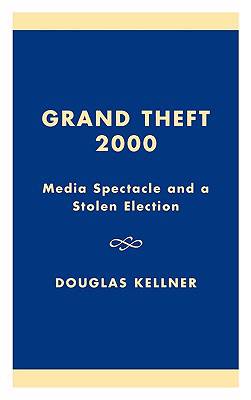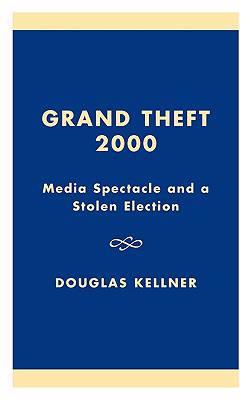
- Retrait gratuit dans votre magasin Club
- 7.000.000 titres dans notre catalogue
- Payer en toute sécurité
- Toujours un magasin près de chez vous
- Retrait gratuit dans votre magasin Club
- 7.000.000 titres dans notre catalogue
- Payer en toute sécurité
- Toujours un magasin près de chez vous
261,45 €
+ 522 points
Description
The battle for the White House following the election of November 7, 2000 was arguably one of the major media spectacles in U.S. history, comparable to the Army-McCarthy hearings, the Kennedy assassination, the Watergate hearings, the Iran-Contra affair, the O.J. Simpson trial, and, most recently, the Clinton sex scandals and Impeachment trials. The election was in many ways more contained and circumscribed than these other epochal events, taking place over 36 days from the uncertainty of election night to Al Gore's concession on December 13 and George W. Bush's acceptance of the mantle of President-Elect. The story was highly theatrical with ups and downs, and surprises and reversals, for the candidates and the global audience, exhibiting unpredictability and uncertainty until the end. Its colorful cast of characters and melodramatic story line could hardly be bettered by the most creative Hollywood central casting.
In Grand Theft 2000, Douglas Kellner recounts the story of a stolen election and Republican coup d'etat, focusing on the flaws of the system of democracy in the United States that allowed this event to take place. Kellner examines what the events of Election 2000 tell us about politics in the U.S. today and the alarming consequences for democracy in the battle for the White House. Grand Theft 2000 presents a historical narrative of the heist of the presidency as well as a critique of the media and political system that registers a crisis of democracy in the U.S.A. today. Arguing that the media are largely to blame for the theft of the presidency by the "Bush machine," Kellner shows how failures of voting technology and literacy, Republican manipulation of the Florida electoral process and political system in the counting of the votes, and structural problems with the system of democracy in the United States reveals a crisis of democracy that requires radical measures. Concluding sections on "Lesson and Conclusions" suggests some solutions to the problems revealed and a final secti
In Grand Theft 2000, Douglas Kellner recounts the story of a stolen election and Republican coup d'etat, focusing on the flaws of the system of democracy in the United States that allowed this event to take place. Kellner examines what the events of Election 2000 tell us about politics in the U.S. today and the alarming consequences for democracy in the battle for the White House. Grand Theft 2000 presents a historical narrative of the heist of the presidency as well as a critique of the media and political system that registers a crisis of democracy in the U.S.A. today. Arguing that the media are largely to blame for the theft of the presidency by the "Bush machine," Kellner shows how failures of voting technology and literacy, Republican manipulation of the Florida electoral process and political system in the counting of the votes, and structural problems with the system of democracy in the United States reveals a crisis of democracy that requires radical measures. Concluding sections on "Lesson and Conclusions" suggests some solutions to the problems revealed and a final secti
Spécifications
Parties prenantes
- Auteur(s) :
- Editeur:
Contenu
- Nombre de pages :
- 264
- Langue:
- Anglais
Caractéristiques
- EAN:
- 9780742521025
- Date de parution :
- 28-08-01
- Format:
- Livre relié
- Format numérique:
- Genaaid
- Dimensions :
- 151 mm x 233 mm
- Poids :
- 503 g







